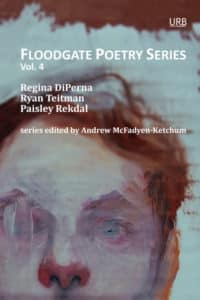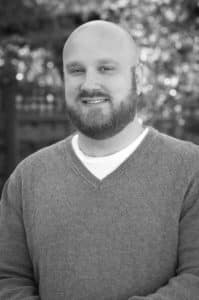The chapbook has been around longer than one might think. It was first made possible by the invention of the printing press, and as early as the 1500s chapbooks were being published, filled with stories, nursery rhymes, poems, Bible verses, and just about anything else people were interested in.

For the past four years, the Floodgate Poetry Series has published an annual collection of chapbooks, usually including three chapbooks selected by the editor, Andrew McFayden-Ketchum. This year’s publication, the Floodgate Poetry Series Vol. 4, features chapbooks by three poets: Regina DiPerna, Ryan Teitman, and Paisley Rekdal.
The 20 poems of DiPerna’s Map of Veins are focused on a single subject and theme, the death of a lover. It’s a series of elegies, considering the death and its impact, with the funeral happening every early in the sequence. The impact is felt more, and understood more, as time passes.
After

Regina DiPerna
The peony and its necessity on a branch
strung softly with lights. It was always
summer with you. Another star
on a string, another velvet something
for a suitcase. After your funeral,
your father and I stood facing each other
in your back yard, looking for you
in each other’s faces. The shape
and color of you, your eyes drawing in
the earth as you fell, a map of nothing.
DiPerna received an M.F.A. from the University of North Carolina-Wilmington. Her poems have been published in Missouri Review, Boston Review, Passages North, and other literary journals. She also received a three-month fellowship from the Helene Wurlitzer Foundation. She lives in New York City.
Ryan Teitman’s Jesuits includes 18 poems addressing relationships, and especially relationships between fathers and children. Teitman often uses literature and popular culture to explore and understand these relationships, seeking a deeper understanding of self. This isn’t about dysfunctional relationships suggesting that even in loving relationships something must be sought and explained.
Sonnet with Horses Where the Turn Should Be

Ryan Teitman
I was afraid of my father. Each night,
he came home from work, set a Piels
on the desk, and paid bills as the dog slept
under his feet. My father—who never
hit me, nor ever raised his voice to me
more than once or twice, who never spared me
any affection—I feared him the way
I feared horses: their long muscles moving
like unsheathed swords, their eyes silver dollar-
sized wells of darkness. Something noble in
the face of a horse, Larry Levis wrote,
made it “incapable of treachery.”
My father had the look of a horse worked
years too long, laboring not to falter.
Teitman is the author of Litany of the City: Poems (2012), chosen by Jane Hirshfield as the winner of the A. Poulin Jr. Prize. His poems have been published in a several literary journals and he was a Wallace Stegner Fellow at Stanford University. He received an MFA in creative writing and an MA in English from Indiana University. He lives in Philadelphia.
Rekdal’s Philomela reads almost like a journal—a journal about the experience of sexual violence. It’s based on the mythical story of Philomela, a daughter of a king of Athens who is raped and disfigured by her brother-in-law and who is transformed into a nightingale. The poet uses the myth to write about her own rape and the aftermath.
From Philomela:

Paisley Rekdal
In my poem “Philomela,” the rape isn’t described. It takes place off stage, recorded years after the event by the character who experienced it. I left out the rape, thinking to reject a reader’s voyeurism. But the reader knows what is left out: my silence, then, is not a revision but an invitation to imagine the violence for yourself.
Rekdal’s poetry collections include A Crash of Rhinos (2000), Six Girls Without Pants (2002), The Invention of the Kaleidoscope (2007), Animal Eye (2012), and Imaginary Vessels (2016). She’s also published a collection of essays, The Night My Mother Met Bruce Lee (2002), and a book-length essay, The Broken Country: On Trauma, a Crime, and the Continuing Legacy of Vietnam (2017). Rekdal has received numerous fellowships and recognitions, and her poetry has been published in a wide array of literary publications. She teaches at the University of Utah. Rekdal was named Utah’s poet laureate in 2017.
All three poets included in the series use prose and verse forms of poetry. But what they write about, the images and metaphors they use, are as individual as themselves and their themes. Kudos to the Floodgate series for bringing these collections together, providing examples of some of the beautiful poetry being written.
Photo by SirisVisual, Creative Commons, via Flickr. Post by Glynn Young, author of the novels Dancing Priest, A Light Shining, and the newly published Dancing King, and Poetry at Work.
__________________________

“I require all our incoming poetry students-in the MFA I direct-to buy and read this book.”
-Jeanetta Calhoun Mish
- Poets and Poems: Beth Copeland and “I Ask the Mountain to Heal My Heart” - July 10, 2025
- A.E. Stallings: the Parthenon Marbles, Poets, and Artists - July 8, 2025
- Poets and Fables: Steven Flint and “The Sun and the Boy” - July 3, 2025

Sandra Heska King says
Thanks for explaining what a chapbook is. I never did quite have the hang of them. I like that these seem to have a specific theme.
I read “After” before I read your introduction to it. My first impression was that it was the narrator’s older child who had died. I think it was the “looking for you in each other’s faces.”